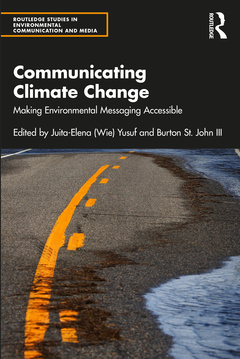Communicating Climate Change Making Environmental Messaging Accessible Routledge Studies in Environmental Communication and Media Series
Coordonnateurs : Yusuf Juita-Elena (Wie), St. John III Burton

This edited collection focuses on theoretical and applied research-based observations concerning how experts, advocates, and institutions make climate change information accessible to different audiences.
Communicating Climate Change concentrates on three key elements of climate change communication ? access, relevance, and understandability ? to provide an overview of how these aspects allow multiple groups of stakeholders to act on climate-related information to build resilience. Featuring contributions from a wide range of scholars from across different disciplines, this book explores a multitude of different scenarios and communication methods, including social media; public opinion surveys; participatory mapping; and video. Overall, climate change communication is addressed from three different perspectives: communicating with the public; communicating for stakeholder engagement; and organizational, institutional, risk, and disaster communication.
With each chapter focusing on implications and applications for practice, this book will be of great interest to students and researchers of climate change and environmental communication, as well as practitioners interested in understanding how to better engage stakeholders through climate change-related communication.
1. Introduction: The Challenges of Communicating about Climate Change in the Modern Era Part 1: Communicating with the Public 2. Asking Questions for Adaptation: Using Public and Stakeholder Surveys as a Tool Within Coastal Climate Change Policy Processes 3. Engaging Residents in Policy and Planning for Sea Level Rise: Application of the Action-Oriented Stakeholder Engagement for a Resilient Tomorrow (ASERT) Framework 4. Communicating Within Immersion and Presence: The Use of 360-Degree-Video to Make Climate Change Touchable Part 2: Communicating for Stakeholder Engagement 5.Communicating and Co-Producing Information with Stakeholders: Examples of Participatory Mapping Approaches Related to Sea Level Rise Risks and Impacts 6. Social Media and Climate Change Dialogue: A Review of the Research and Guidance for Science Communicators 7. Key Elements of User Preferences for Flood Alerts and Implications for the Design and Development of Flood Alert or Warning Systems Part 3: Organizational, Institutional, Risk and Disaster Communication 8. The Standing Rock Water Protests Against Dakota Access Pipeline: Addressing Environmental Degradation Through Indigenous Political Ecology as the "Trickster Science" 9. Risk Communication in the Tourism Industry 10. Risk Management and Biases in How Drivers Respond to Nuisance Flooding 11. Rethinking Disaster Communication Ecology: Exploring Context in Isolated Communities in The Philippines Part 4: Conclusion 12. Toward Accessible Messaging and Effective Climate Change Communication
Juita-Elena (Wie) Yusuf is a professor of public service in the Strome College of Business, Old Dominion University (ODU), USA and Assistant Director of the ODU Institute for Coastal Adaptation and Resilience.
Burton St. John III is a professor of public relations and associate chair of the Advertising, Public Relations, and Media Design Department at the University of Colorado–Boulder, USA.
Date de parution : 11-2021
15.6x23.4 cm
Date de parution : 11-2021
15.6x23.4 cm
Thèmes de Communicating Climate Change :
Mots-clés :
Climate Change Communication; Climate Change; Hampton Roads Region; resilience; Risk Communication; communicating resilience; Nuisance Flooding; information accessibility; Flood Alert System; environmental communciation; SLR; Tourism Business Owners; Virginia Beach; crisis communication; Severe Weather Event; stakeholder engagement; Disaster Communication; CSR Communication; Hampton Roads; Destination Management Organizations; Public Engagement; Local Knowledge; Climate Change Information; Flood Risks; Participatory Mapping Approach; RPA Framework; Participatory Mapping; Tybee Island; Be; Expert Searcher; RPA



